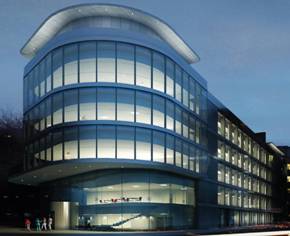Liverpool universities and hospitals to build 2 million sq ft BioInnovation Centre
2 February 2012
The Liverpool BioInnovation Centre is a 2 million square foot project that aims to create up to 5000 high tech jobs and make Liverpool a world class centre of innovation in the life sciences.
The Centre is a partnership between the Royal Liverpool and Broadgreen University Hospitals NHS Trust, the University of Liverpool, Liverpool John Moores University, the Liverpool School of Tropical Medicine and other partners. The project is being backed by the City Council, Liverpool Vision and The Mersey Partnership, and was highlighted in the recent report from Lord Heseltine and Sir Terry Leahy as the city’s number one economic development objective.
In the first phase, the project has submitted a planning application for a 70,000 sq ft building with state-of-the-art commercial scale laboratory space where new life-saving treatments and technologies can be tested and developed for the commercial market place.

BIC will provide laboratory space, business support and commercialisation, and networking facilities, for both new and growing life science businesses emerging from the research base. It arose from the existing MerseyBIO, which has been identifying new commercial opportunities from the local research base, supporting their development and housing early-stage life science businesses, but has been operating at capacity for some years
Chief executive of the Royal Liverpool and Broadgreen University Hospitals NHS Trust, Tony Bell explained: “This is an exciting and significant moment as the BioInnovation Centre is the catalyst that will enable us to realise the wider vision for the BIoCampus. The key to successful knowledge economies is being able to connect academic and specialist research assets to emerging technologies that have major market potential, which is the Silicon Valley model and it’s something that the BioCampus has been designed to emulate.
“The new Royal Liverpool University Hospital will provide the opportunity to fully develop the BioCampus and the development will provide the ability to carry out research in clinical environments. This development can define what Liverpool’s future economy is about and is key to regeneration.”
The BioCampus model fits precisely with the collaborative approach being proposed by Government in their recently launched national strategy aimed at establishing the UK as a global leader in the Life Science sector. It will build on the world-renowned expertise of Liverpool’s academic and clinical research institutions to create a cluster of inventive high growth Life Science companies like the bio-sector’s national start-up of the year, RedX Pharma which is already established within Liverpool’s Knowledge Quarter.
RedX Pharma chief executive, Dr Neil Murray added: “The BioCampus is the right development in the right place. Our success and growth is undoubtedly to do with where we are, the networks we are involved in, and the knowledge, expertise and innovation that is located within this area. This is a unique alignment of assets that can generate enormous prosperity and prestige for the city.”
Liverpool City Council Leader, Cllr Joe Anderson said: “This is a sector where Liverpool has, without doubt, a world-class offer and a unique competitive edge. In terms of scale the economic potential of the BioCampus is on a par with Salford’s Media City, but in terms of importance and human value it’s on another level.
“There is a strong affinity between this project and Liverpool’s own values and history. We are inventive and pioneering but we are also a compassionate and humanitarian city. The treatments and technologies pioneered here will create employment and prosperity for Liverpool, but will transform lives across the globe. We are building an economy for life.”
Max Steinberg, chief executive of Liverpool Vision, added: “These ambitious and exciting proposals will be a key component of Liverpool’s future success in this sector.
“The BioCampus which will lie within the city’s Knowledge Quarter is crucial in helping to promote Liverpool as an international destination for scientists, academics and students and will in turn help propel the city’s reputation as one of the UK’s main centres of excellence and to nurture lifelong innovation and creativity.”
Following completion of planning and an ERDF funding process, work on The Liverpool BioInnovation Centre could commence as early as mid-2012 with completion expected by early 2014. The following phases of the BioCampus project will be delivered in concert with the construction of the new Royal Liverpool University Hospital. Partners believe that the completed 2 million sq ft development could be completed by 2025.